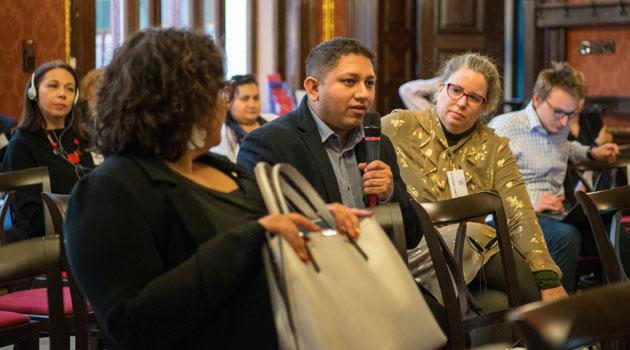Michal Mižigár: What democracy brought us Romani people in the Czech Republic in the 1990s

In the Czech Republic of the 1990s, postcommunist democracy brought us Romani people opportunities for self-determination as a national minority, the publication of books and magazines in the Romanes language, and many other activities. Unfortunately, everything has its pros and cons.
Democracy also brought Romani people things they never anticipated. Being excluded from society, falling into poverty, even fearing for their lives.
I spent my own childhood in those days with my grandfather and grandmother, growing up on Kollárova Street. My grandparents lived around the corner from the Danihel family, and in the 1990s, poor Tibor Danihel was killed by skinheads in the Otava river that flows through the town of Písek on the day before what would have been his 18th birthday.
Back then my grandparents lived in an apartment on the first floor. I remember skinheads marching down our street in broad daylight and all of us lying flat on the floor so they wouldn’t see us through the windows, then slowly escaping up to my great-grandmother’s apartment on the third floor.
I recall saying to my grandmother recently, “Grandma, I once had a dream that we were walking along Kollárova Street together, and you had just bought potatoes in those little paper sacks they used to use, and as we approached our building, the skinheads began chasing us. You grabbed my hand, we began running, and that little sack of potatoes tore open and the potatoes fell all over the sidewalk…”
My grandmother just looked at me and said: “That was no dream. That really happened.”
Even though I was just a child back then, I will always remember that the 1990s in the Czech Republic were actually very harsh for us Roma. There was a big depression in the community.
Our Romani people formed their own security patrols, they had to protect themselves on their own. I recall my schoolteachers, up until I was in the fourth grade (roughly until the year 2000) writing notes for us Romani children to take home to our parents warning them not to bring us to school the next day because they didn’t want anything bad to happen to us on the way there – and assuring them that they would excuse the absence.
I have the feeling that it bothered nobody at all that several Romani people were murdered during that time in this country. The Czech justice system very often failed to punish the perpetrators, or if these crimes did manage to be recognized as murders, their racial motivation was ignored.
The boys got away with it until the year 2009, when Natálka Siváková, who was just two years old, paid for their violence by suffering burns over 80 % of her body. Punishments were indeed handed down for that crime, and they were proper ones.
I don’t believe it’s necessary for us to play at being big Romani nationalists, or to pretend to be the big Romani man. However, each Romani person should endeavor, according to his or her capacity, to bring antigypsyism or antitziganism into the broader public discussion in all areas of life, from activism for equal rights to working in academia.
